Panneau latéral
Ouvrages publiés / Published books
2021 - Automating Linguistics
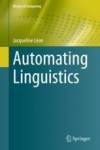 Léon Jacqueline, 2021. Automating Linguistics. Cham : Springer. History of Computing. XV, 179 p. ISBN : 978-3-030-70641-8.
Léon Jacqueline, 2021. Automating Linguistics. Cham : Springer. History of Computing. XV, 179 p. ISBN : 978-3-030-70641-8.
Automating Linguistics offers an in-depth study of the history of the mathematisation and automation of the sciences of language. In the wake of the first mathematisation of the 1930s, two waves followed: machine translation in the 1950s and the development of computational linguistics and natural language processing in the 1960s. These waves were pivotal given the work of large computerised corpora in the 1990s and the unprecedented technological development of computers and software.Early machine translation was devised as a war technology originating in the sciences of war, amidst the amalgamate of mathematics, physics, logics, neurosciences, acoustics, and emerging sciences such as cybernetics and information theory. Machine translation was intended to provide mass translations for strategic purposes during the Cold War. Linguistics, in turn, did not belong to the sciences of war, and played a minor role in the pioneering projects of machine translation.Comparing the two trends, the present book reveals how the sciences of language gradually integrated the technologies of computing and software, resulting in the second-wave mathematisation of the study of language, which may be called mathematisation-automation. The integration took on various shapes contingent upon cultural and linguistic traditions (USA, ex-USSR, Great Britain and France). By contrast, working with large corpora in the 1990s, though enabled by unprecedented development of computing and software, was primarily a continuation of traditional approaches in the sciences of language sciences, such as the study of spoken and written texts, lexicography, and statistical studies of vocabulary.
Il s’agit d’une traduction d’une version remaniée de l’ouvrage Histoire de l’automatisation des sciences du langage paru à ENS Editions en 2015.
2021 - Ad Placitum : pour Irène Rosier-Catach
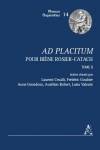 Textes réunis par Laurent Cesalli, Frédéric Goubier, Anne Grondeux, Aurélien Robert, Luisa Valente. 2021. Ad placitum : pour Irène Rosier-Catach. Arricia : Aracne editrice. (Flumen sapientiae, 14). 2 tomes. 684 p. ISBN : 978-88-255-3913-4
Textes réunis par Laurent Cesalli, Frédéric Goubier, Anne Grondeux, Aurélien Robert, Luisa Valente. 2021. Ad placitum : pour Irène Rosier-Catach. Arricia : Aracne editrice. (Flumen sapientiae, 14). 2 tomes. 684 p. ISBN : 978-88-255-3913-4
Ce volume est un florilège libre des manières dont les ami.e.s, élèves et collègues d’Irène Rosier-Catach ont souhaité rendre hommage à son œuvre comme à sa personne. En dépit de son titre en forme de mot d’ordre – ad placitum – l’ensemble de ces 87 textes traite, sous un rapport ou un autre, de la thématique centrale des travaux d’Irène Rosier-Catach, à savoir le langage. La diversité des formes et des langues reflète la très large et riche communauté qui s’est formée autour d’elle. Une publication atypique, pour une figure hors du commun.
2021 - Les anagrammes
 Testenoire Pierre-Yves, 2021. Les anagrammes. Paris : Humensis. (Que sais-je ?, 4176) 125 p. ISBN : 978-2-7154-0090-0
Testenoire Pierre-Yves, 2021. Les anagrammes. Paris : Humensis. (Que sais-je ?, 4176) 125 p. ISBN : 978-2-7154-0090-0
Savez-vous qu’« un véto corse la finira », « la Révolution française » ? Qui se cache derrière le nom d’Avida Dollars, d’Alcofribas Nasier ou encore de Louis Jenrel ?
Vous avez dit « anagramme » ? Pierre-Yves Testenoire revient sur cette figure de style qui consiste à permuter les lettres d’un mot ou d’une expression pour en tirer un autre mot ou une autre expression, de sens radicalement différent, souvent loufoques. Tellement, qu’on les dirait parfois dotées du pouvoir de révéler le vrai sens des mots.
Cet art de cryptage autant que de décryptage est pratiqué depuis la plus haute Antiquité. Dans toutes les langues alphabétiques, on fait des anagrammes, qui peuvent prendre des formes variées : tantôt anacycliques ou palindromiques, tantôt saussuriennes ou psychanalytiques. Il existe même des anagrammes musicales ! Avec ce livre, elles n’auront plus de secrets pour vous.
2020 - Historical journey in a linguistic archipelago: Descriptive concepts and case studies
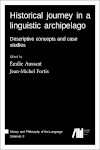 Émilie Aussant et Jean-Michel Fortis (eds.), 2020. Historical journey in a linguistic archipelago: Descriptive concepts and case studies. Berlin : Language Science Press. History and Philosophy of the Language Sciences. 212 p. ISBN : 978-3-96110-293-8
Émilie Aussant et Jean-Michel Fortis (eds.), 2020. Historical journey in a linguistic archipelago: Descriptive concepts and case studies. Berlin : Language Science Press. History and Philosophy of the Language Sciences. 212 p. ISBN : 978-3-96110-293-8
This volume offers a selection of papers presented during the 14th International Conference on the History of the Language Sciences (ICHoLS XIV, Paris, 2017). Part I brings together studies dealing with descriptive concepts. First examined is the notion of “accidens” in Latin grammar and its Greek counterparts. Other papers address questions with a strong echo in today’s linguistics: localism and its revival in recent semantics and syntax, the origin of the term “polysemy” and its adoption through Bréal, and the difficulties attending the description of prefabs, idioms and other “fixed expressions”. This first part also includes studies dealing with representations of linguistic phenomena, whether these concern the treatment of local varieties (so-called patois) in French research, or the import and epistemological function of spatial representations in descriptions of linguistic time. Or again, now taking the word “representation” literally, the visual display of grammatical relations, in the form of the first syntactic diagrams. Part II presents case studies which involve wider concerns, of a social nature: the “from below” approach to the history of Chinese Pidgin English underlines the social roles of speakers and the diversity of speech situations, while the scrutiny of Lhomond’s Latin and French textbooks demonstrates the interplay of pedagogical practice, cross-linguistic comparison and descriptive innovation. An overview of early descriptions of Central Australian languages reveals a whole spectrum of humanist to positivist and antihumanist stances during the colonial age. An overarching framework is also at play in the anthropological perspective championed by Meillet, whose socially and culturally oriented semantics is shown to live on in Benveniste. The volume ends with a paper on Trần Đức Thảo, whose work is an original synthesis between phenomenology and Marxist semiology, wielded against the “idealistic” doctrine of Saussure.
2020 - Excerptiones super Priscianum
Louis Holtz, Anne Grondeux (eds.), Alcuinus. 2020. Excerptiones super Priscianum. Turnhout : Brepols. (Corpus Christianorum Continuatio Mediaevalis, CCCM 304), CI+262 p., ISBN: 978-2-503-58875-9.
Conservées dans quatre manuscrits, dont un palimpseste, du IXe siècle, les Excerptiones super Priscianum d’Alcuin constituent un témoin exceptionnel de la lecture de Priscien par le « maître des maîtres ». Cette mosaïque d’extraits nous montre comment Alcuin réordonne la lecture de Priscien dans la perspective résolument innovante de la syntaxe, rompant avec les utilisations ponctuelles qui pouvaient être auparavant faites de l’Ars Prisciani, par exemple pour commenter Donat ou éclairer tel point technique. Le caractère magistral de cette œuvre tient au fait qu’Alcuin se révèle le seul à avoir saisi que les seize premiers livres constituaient une propédeutique aux deux derniers et à la maîtrise qui lui permet de relier constamment les fils invisibles qui unissent les deux parties de l’ouvrage. L’édition critique est précédée d’une introduction et complétée par une série d’annexes centrées sur la méthodologie d’Alcuin.
Cet ouvrage a reçu le prix Jean-Charles Perrot de l'Académie des Inscriptions et Belles-Lettres.
2020 - Scolastiques indiennes
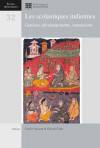 Émilie Aussant et Gérard Colas (eds.). 2020. Les scolastiques indiennes : genèses, développements, interactions. Paris : École Française d'Extrême-Orient. (Études thématiques, 32). 326 p. ISBN : 9782855392707
Émilie Aussant et Gérard Colas (eds.). 2020. Les scolastiques indiennes : genèses, développements, interactions. Paris : École Française d'Extrême-Orient. (Études thématiques, 32). 326 p. ISBN : 9782855392707
L’étude moderne des disciplines intellectuelles indiennes leur impose souvent une taxinomie disciplinaire occidentale. D’une illusoire objectivité, cette taxinomie met implicitement en œuvre des analogies parfois trompeuses et des techniques intellectuelles elles-mêmes frappées d’historicité. Le recours à des catégories occidentales comme « indologie », « philosophie » et « raison », mais aussi indiennes comme « śāstra » se heurte inévitablement à des objections théoriques. Ce volume prend le parti expérimental d’employer « scolastique » dans un sens large, non dans la conception médiévale du terme. Il veut éclairer le rapport entre pratiques scolastiques indiennes et émergence des systèmes, crises et apories, ainsi que les limites de l’appréhension des faits par les scolastiques et leur délicate dialectique avec les pratiques concrètes. Les contributions illustrant ces questions concernent les techniques d’exégèse et de débat, les doctrines, la grammaire, le droit, le rituel, la poétique et l’astronomie.
2020 - La latinité injustement soupçonnée. Suivi de Dissertation sur la latinité de Plaute
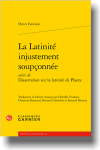 Estienne, Henri. Ed. et trad. par Danielle Trudeau, Christian Barataud, Bernard Colombat et Moreux Bernard. 2020. La latinité injustement soupçonnée. Suivi de Dissertation sur la latinité de Plaute. Paris : Classiques Garnier. (Textes de la Renaissance. Traités sur la langue française, n°19) 807 p. ISBN : 978-2-406-09434-0
Estienne, Henri. Ed. et trad. par Danielle Trudeau, Christian Barataud, Bernard Colombat et Moreux Bernard. 2020. La latinité injustement soupçonnée. Suivi de Dissertation sur la latinité de Plaute. Paris : Classiques Garnier. (Textes de la Renaissance. Traités sur la langue française, n°19) 807 p. ISBN : 978-2-406-09434-0
L’ouvrage d’Henri Estienne, pour la première fois traduit du latin en français, contient deux essais : De Latinitate falsò suspecta, une vaste étude d’équivalences entre latin et français, et De Plauti Latinitate Dissertatio, une introduction au latin archaïque de Plaute et à certains problèmes d’édition.
2020 - L'utopie de l'art : mélanges offerts à Gérard Dessons
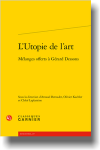 Arnaud Bernadet, Olivier Kachler, Chloé Laplantine (eds). 2020. L'utopie de l'art : mélanges offerts à Gérard Dessons. Paris : Classiques Garnier. (Rencontres. Etudes dix-neuvièmistes, n° 52). 697 p. ISBN 978-2-406-08963-6
Arnaud Bernadet, Olivier Kachler, Chloé Laplantine (eds). 2020. L'utopie de l'art : mélanges offerts à Gérard Dessons. Paris : Classiques Garnier. (Rencontres. Etudes dix-neuvièmistes, n° 52). 697 p. ISBN 978-2-406-08963-6
Ce livre qui réunit les contributions d’une quarantaine de poètes, de plasticiens ou d’essayistes constitue un hommage admiratif à la recherche et à l’enseignement de Gérard Dessons, centrés sur la question de l’art, que ce soit dans le domaine de la peinture, du théâtre ou de la poésie.
2020 - Missionary Linguistic Studies from Mesoamerica to Patagonia
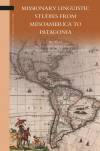 Astrid Alexander Bakkerus, Rebeca Fernández Rodríguez, Liesbeth Zack and Otto Zwartjes (ed.) Missionary Linguistic Studies from Mesoamerica to Patagonia. Boston : Brill, 2020. Brill's Studies in Language, Cognition and Culture, 22. ISBN : 978-90-04-42460-9
Astrid Alexander Bakkerus, Rebeca Fernández Rodríguez, Liesbeth Zack and Otto Zwartjes (ed.) Missionary Linguistic Studies from Mesoamerica to Patagonia. Boston : Brill, 2020. Brill's Studies in Language, Cognition and Culture, 22. ISBN : 978-90-04-42460-9
Missionary Linguistic Studies from Mesoamerica to Patagonia presents the results of in-depth studies of grammars, vocabularies and religious texts, dating from the sixteenth – nineteenth century. The researches involve twenty (extinct) indigenous Mesoamerican and South American languages: Matlatzinca, Mixtec, Nahuatl, Purépecha, Zapotec (Mexico); K’iche, Kaqchikel (Guatemala); Amage, Aymara, Cholón, Huarpe, Kunza, Mochica, Mapudungun, Proto-Tacanan, Pukina, Quechua, Uru-Chipaya (Peru); Tehuelche (Patagonia); (Tupi-)Guarani (Brazil, Paraguay, Uruguay). The results of the studies include: a) a digital model of a good, conveniently arranged vocabulary, applicable to all indigenous Amerindian languages; b) disclosure of intertextual relationships, language contacts, circulation of knowledge; c) insights in grammatical structures; d) phone analyses; e) transcriptions, so that the texts remain accessible for further research. f) the architecture of grammars; g) conceptual evolutions and innovations in grammaticography.
2020 - History of linguistics 2017
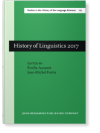 Emilie Aussant et Jean-Michel Fortis (ed.). History of Linguistics 2017 : Selected papers from the 14th International Conference on the History of the Language Sciences, (ICHoLS 14), Paris, 28 August – 1 September. Amsterdam : John Benjamins, 2020. Studies in the History of the Language Sciences, 127. xviii, 245 pp. ISBN : 9789027205469
Emilie Aussant et Jean-Michel Fortis (ed.). History of Linguistics 2017 : Selected papers from the 14th International Conference on the History of the Language Sciences, (ICHoLS 14), Paris, 28 August – 1 September. Amsterdam : John Benjamins, 2020. Studies in the History of the Language Sciences, 127. xviii, 245 pp. ISBN : 9789027205469
The present book is a selection of papers from the 14th International Conference on the History of the Language Sciences (Paris 2017). The volume is divided thematically into three parts: I. Notions and categories, II. Representations and receptions, III. Learning, codification and the linguistic practices of social actors. The first part is especially concerned with data not easily handled by extant traditions of linguistic analysis, and with constructs and perspectives which proved difficult to establish in the linguist’s descriptive apparatus. Part II groups six studies dealing with alternative representations of linguistic data, and matters of interpretation and reception regarding the work of three important linguists (Saussure, Jespersen, Chomsky). The scope of part III embraces social and pedagogical practices as well as the involvement of linguists in questions of national identity.


